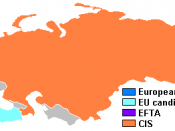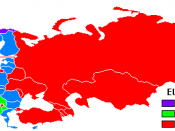Fundamentally, Calleo argues that the disintegration of the Soviet Union acted as a means to "thrust" Western Europe into a closer alliance of cooperation . Calleo uses the EU in its current form to demonstrate that "integration succeeds when member states can compromise around broadly shared interests, particularly those shared by France and Germany" (178). It can be said that the changed security landscape following the Cold War and the premise that with the Soviet Union's collapse, the states of Western Europe had the resources to concentrate more on economic integration and development than managing the traditional security threats that they had battled for almost 50 years. However, he argues that this rapid move towards increased integration, particularly over the last 15 years, has also left the confederacy vulnerable to new challenges and "old centrifugal forces", Today, The United States, the sole remaining superpower, can be regarded, according to Calleo, as "the benevolent hegemon of an increasingly integrated world system" -- a Pax Americana where inexorable forces of modernization eroded other nation states, not least the ancient states of Europe.
Calleo is quick to demonstrate that the EU is not just successful because of the disintegration of the Soviet Union, but that it is assisted and driven largely by the fact that France and Germany have made a conscious decision to cooperate to combat this American hegemony.
It can be argued that the so-called imperial fantasies of America will persist long enough to defeat constitutional dreams of Europe as deep political fractures have opened in the West with contending and conflicting visions of the future having arisen on each side of the Atlantic. The United States, who many believe is primarily driven by its disproportionate economic and military strength, has according to many developed a unipolar, hegemonic vision of...



Clarify.
Sorry, but what do you mean about the US's "imperial fantasies" and how waht is needed now is 'piety'?
1 out of 4 people found this comment useful.